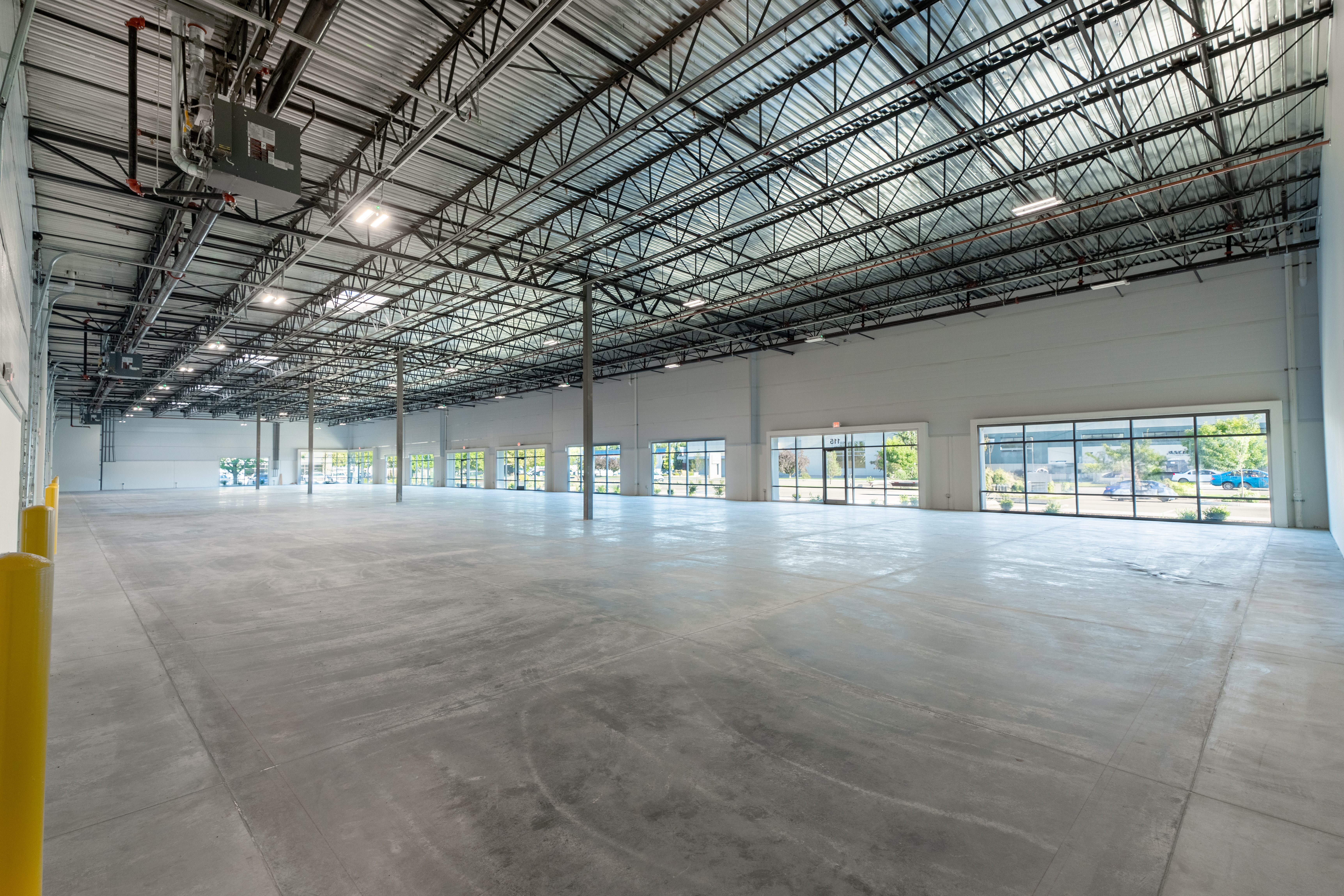In today’s rapidly evolving business landscape, the demand for commercial warehouse space is stronger than ever. This surge is largely fueled by the exponential growth of e-commerce, where fast shipping and real-time inventory management have become the norm. At the same time, advancements in logistics technology, from automated inventory systems to smart warehousing solutions, have pushed companies to rethink their supply chain strategies. As a result, businesses are increasingly in need of well-located, high-functioning warehouses that can handle diverse storage and distribution requirements. This demand is further compounded by the rise in domestic manufacturing and global trade activity, making warehouse space not just a tactical requirement but a long-term operational advantage. Whether for staging products, fulfilling customer orders, or housing specialized inventory, warehouses now play a central role in the modern business ecosystem.
For companies looking to scale, stabilize, or optimize operations, purchasing a commercial warehouse property for sale is a strategic move with long-term benefits. Owning a warehouse provides control over logistics infrastructure, reduces reliance on third-party leasing, and offers potential for value appreciation over time, especially in markets where industrial real estate is in short supply. However, this type of investment requires careful consideration. Factors like ceiling height, loading dock access, structural layout, environmental risk, and zoning laws all play a critical role in determining whether a property meets your current and future needs. Additionally, location is more than a convenience, it’s a competitive advantage. Warehouses near major highways, ports, or urban centers can significantly reduce delivery times, improve supply chain efficiency, and offer better access to skilled labor. Without the right guidance, it’s easy to overlook these crucial details and risk making a costly investment mistake.
That’s where Adler Industrial comes in. As an experienced partner in commercial real estate, we specialize in helping investors and business owners navigate the complex process of purchasing warehouse properties. We go beyond traditional brokerage to provide tailored insight into each client’s operational goals, industry requirements, and financial expectations. From evaluating floor plans and negotiating terms to managing inspections and permits, we’re with you every step of the way. Our deep market knowledge and access to exclusive listings allow us to identify high-performing properties that align with your objectives. Whether you’re in manufacturing, distribution, retail, or logistics, we take the time to understand your unique challenges and opportunities. At Adler Industrial, our mission is to simplify your warehouse investment journey, so you can focus on growing your business with confidence.
Assessing Your Business or Investment Needs
The first step in purchasing a warehouse property is developing a clear understanding of how the space will be utilized. This decision lays the foundation for every other aspect of the buying process. Whether your operation involves storage, distribution, manufacturing, or a combination of all three, each use case presents distinct requirements in terms of design, layout, accessibility, and infrastructure. Having a defined purpose will help you evaluate potential properties with precision, avoiding costly retrofits and inefficiencies down the line.
- Storage Needs: If the primary function of the warehouse will be to store goods, it’s important to assess the volume and types of items being stored. Are you housing large industrial equipment, pallets of packaged products, or smaller consumer goods? These considerations impact the amount of floor space required and whether vertical storage solutions such as high shelving or racking systems are necessary. Additionally, climate control might be needed for sensitive inventory like food, pharmaceuticals, or electronics. You’ll also want to evaluate the layout to ensure efficient movement within the space, clear aisles for forklifts, designated zones for inventory types, and systems for quick access and inventory management. In many storage-focused facilities, minimal office space is required, so a warehouse with more open floor area and fewer built-in offices may be more suitable and cost-effective.
- Distribution: Warehouses focused on distribution have different spatial demands, with an emphasis on efficient movement in and out of the facility. One of the most critical features is the number, size, and positioning of loading docks. You’ll need to consider how frequently trucks will be arriving, the size of the delivery vehicles, and whether there’s sufficient room for maneuvering and staging shipments. The inclusion of equipment such as conveyor belts, automated sorters, or package scanners may also influence the internal layout. Speed and accessibility are key, so proximity to highways, intermodal hubs, or major urban centers can play a significant role in your site selection. A well-designed distribution warehouse should facilitate smooth logistics, reduce bottlenecks, and ultimately support faster order fulfillment and lower transportation costs.
- Manufacturing: When using a warehouse as a manufacturing site, the building must meet several unique requirements to support daily operations. First, the structure must accommodate the physical demands of production machinery, including adequate ceiling height for overhead cranes or tall equipment and reinforced floors capable of handling heavy loads. The electrical infrastructure should support industrial-level power needs, often including three-phase power and designated panels for specialized equipment. Ventilation, safety features, and compliance with zoning or environmental regulations are also essential factors to assess. In many manufacturing setups, there is also a need for office spaces to house administrative staff, meeting rooms, or engineering departments. A warehouse optimized for production should allow for a seamless flow between raw materials, manufacturing, and shipping, reducing operational inefficiencies and supporting long-term business growth.
- Mixed-Use: Many businesses today require a combination of storage, light manufacturing, and office space, creating demand for what are known as “flex properties.” These mixed-use warehouse spaces offer a blend of functionality under one roof, which can be highly efficient and cost-effective for small to mid-sized businesses. The challenge lies in balancing the needs of each function. For instance, manufacturing or assembly zones may need sound insulation or increased ventilation, while office areas require comfortable working conditions, natural light, and modern telecommunications infrastructure. Storage areas, on the other hand, benefit from open floor plans and vertical shelving. Designing these spaces with flexibility in mind allows companies to scale or shift functions as business needs evolve. A well-designed flex property promotes collaboration across departments, simplifies logistics, and can reduce operating expenses by consolidating multiple needs into one strategic location.
At Adler Industrial, we understand that every warehouse user has unique objectives and operational requirements. That’s why we go beyond just identifying available properties, we collaborate with clients to align the specific features of a warehouse with the long-term vision of the business. Whether you’re a large manufacturer needing extensive square footage and heavy-duty infrastructure, or a small business seeking an adaptable, multi-purpose space, our team brings the expertise and local market knowledge to guide you toward the right investment. We focus on ensuring that the space not only meets your current demands but is also equipped to evolve with your business as it grows. Your success starts with the right foundation, and we’re here to help you build it.
Location, Location, Location
When purchasing a commercial warehouse, one of the most critical factors to evaluate is the location. Where the warehouse sits on the map influences nearly every operational aspect of the business, from how quickly goods can be received and shipped, to how cost-effectively you can operate. The right location doesn’t just affect current performance; it also impacts long-term appreciation and scalability. A warehouse strategically positioned near key commercial arteries can offer a competitive edge in today’s fast-moving supply chain economy.
- Proximity to Transportation: Warehouses that are close to major transportation corridors, such as interstate highways, railway junctions, seaports, and airports, tend to perform better in terms of logistics and overall operational efficiency. These locations reduce transit times, lower fuel costs, and improve delivery reliability, which is essential for companies operating on tight deadlines or managing high-volume inventories. Moreover, access to multiple modes of transportation, like combining rail freight with air cargo, provides valuable flexibility, allowing companies to pivot their distribution strategies quickly based on supply chain demands. For businesses that rely heavily on just-in-time delivery models or e-commerce fulfillment, this kind of access can directly influence customer satisfaction and profitability.
- Labor Markets: Another important factor in warehouse location is the availability of a strong and skilled labor force. Warehouses require a reliable workforce for roles ranging from material handling and forklift operation to inventory management and logistics coordination. If the warehouse is located in a region with high unemployment or where industrial skills are abundant, you’re more likely to find a steady stream of workers, which can reduce turnover and training costs. Conversely, being in an area with a limited labor pool may lead to operational bottlenecks or increased costs due to wage competition. Whether you’re purchasing a warehouse for your own operations or as a rental investment, choosing a site near vibrant labor markets will enhance your ability to run, or lease, a productive facility.
- Infrastructure: A warehouse’s success is closely tied to the quality and reliability of the surrounding infrastructure. Modern warehousing operations rely heavily on dependable utilities such as electricity, high-speed internet, and water. Interruptions or inconsistencies in these services can lead to operational downtime, which directly impacts business performance. Additionally, being situated near essential infrastructure like trucking hubs, ports, and logistics centers can significantly improve supply chain fluidity. It’s also critical to consider local zoning laws, building regulations, and the municipality’s track record of supporting industrial growth. Locations that are already designated for commercial or industrial use, and that have a business-friendly local government, make it much easier to secure permits, expand operations, or retrofit facilities without red tape or delays.
At Adler Industrial, we specialize in identifying and offering commercial warehouse spaces in high-demand markets such as Boise and other strategically positioned regions. Our focus is on areas where infrastructure is robust, the workforce is strong, and local governments actively encourage business development. We look at the broader economic landscape, including planned transportation expansions, demographic shifts, and regional business trends, to help our clients make investments that are not only profitable today but poised for growth in the years ahead. Whether you’re an owner-operator or a commercial investor, we help you make informed, location-savvy decisions that drive long-term success.
Zoning and Compliance Requirements
Before finalizing a warehouse purchase, it’s crucial to have a thorough understanding of the local zoning laws and building codes that apply to the property. These regulations serve as a foundational guideline for what you can legally do with the space and how you can modify it over time. Overlooking these important legal frameworks can result in significant setbacks, from denied permits to forced changes in operations, which can delay your business plans and increase costs. Taking the time upfront to evaluate the regulatory landscape ensures that the property aligns with your long-term operational goals and minimizes the risk of compliance issues in the future.
- Zoning: Every municipality classifies land into specific zoning categories, such as residential, commercial, and industrial. These categories define what type of activities can legally take place on a given parcel of land. When purchasing a warehouse, it’s important to confirm that the property is zoned specifically for industrial or commercial use, depending on your needs. If your business involves more than just warehousing, such as light manufacturing, product assembly, or customer-facing operations, you may need to apply for a zoning variance or conditional use permit. Failing to verify the zoning designation could mean acquiring a property that cannot legally accommodate your intended use, leading to costly legal battles or wasted investment.
- Building Codes: In addition to zoning, building codes govern the safety, integrity, and structural soundness of the warehouse. These codes cover a wide range of factors including fire safety systems, accessibility standards, electrical configurations, floor load capacity, ceiling height, ventilation systems, and more. For example, if your operations will involve installing heavy machinery or high-capacity storage racks, you need to ensure that the existing floors are rated to handle the additional weight. Similarly, if you plan on remodeling or expanding the space, you’ll need to meet updated code requirements throughout the process. Ignoring these standards not only puts your staff and equipment at risk but can also result in failed inspections, halted construction, or denied occupancy permits.
- Environmental Regulations: Many industrial operations fall under federal, state, or local environmental oversight, especially when hazardous materials, emissions, or waste are involved. Depending on your line of business, you may be subject to stringent regulations related to chemical storage, air quality controls, noise levels, wastewater discharge, or stormwater management. Even if you’re only using the space for general storage, certain products or packaging materials may still trigger regulatory obligations. Conducting an environmental assessment or consulting with regulatory experts early on helps identify any existing contamination on the site and ensures your intended use is compliant with all applicable laws. Neglecting this due diligence could result in expensive fines, cleanup costs, or even restrictions on how you can operate within the facility.
Adler Industrial is highly experienced in navigating the intricate web of zoning laws, building codes, and environmental compliance standards. Our team works closely with local agencies, engineers, and legal professionals to ensure every aspect of your warehouse purchase meets the necessary regulatory benchmarks. By addressing these critical factors during the acquisition phase, we help our clients avoid costly surprises, streamline the due diligence process, and move forward with confidence. When you partner with Adler Industrial, you gain more than just a real estate advisor, you gain a strategic ally who ensures every legal consideration is accounted for so your business can grow without interruption.
Financial Considerations
Investing in a commercial warehouse involves far more than simply looking at the listed price. While the purchase price is a major component, a comprehensive financial evaluation must include both the initial costs and the ongoing expenses that can affect your cash flow and long-term profitability. Understanding the full scope of what this investment entails is crucial for making an informed decision that aligns with your financial goals. Many investors overlook hidden costs or fail to prepare for operational expenses, which can create unforeseen challenges down the road. Taking the time to evaluate these elements in detail will not only protect your investment but also position you for sustainable returns.
- Upfront Costs: One of the first steps in evaluating any warehouse property is determining the total upfront costs, which go beyond the base purchase price. In addition to the negotiated selling price, you’ll encounter closing costs such as legal fees, lender fees, and title insurance. Property taxes on the purchase and recording fees may also be due at closing. If the warehouse requires renovations, upgrades to meet local codes, or tenant-specific improvements, those costs must be anticipated and factored into your overall investment. Investors should also consider how they plan to fund the acquisition, whether through traditional financing, private equity, personal savings, or a combination. Understanding your capital stack is essential to minimize risk and ensure you’re not over-leveraging. Having a solid financial plan in place from the outset lays the groundwork for long-term success.
- Ongoing Expenses: Once the property has been acquired, attention must shift to the recurring costs associated with owning and operating a commercial warehouse. These ongoing expenses often include monthly utility bills, which can vary significantly depending on the size of the building and its usage. Property taxes tend to increase over time and can represent a substantial annual burden. Maintenance costs, such as HVAC servicing, roof repairs, landscaping, and general upkeep, must also be considered, especially in aging properties. Insurance premiums for commercial properties are another key component, as are potential security expenses if the warehouse is located in an area where surveillance or monitoring is needed. All of these operational costs can erode your profit margins if they’re not properly accounted for, making it essential to create a realistic and comprehensive annual budget.
- Return on Investment (ROI): Evaluating the ROI of a warehouse investment is a critical step in determining its long-term viability. ROI is influenced by both the income the property generates and its potential for appreciation over time. For investors planning to lease the space, understanding the local market rental rates and demand for warehouse space is essential. Positive cash flow from reliable tenants can generate a steady income stream that offsets your expenses and contributes to profitability. For those considering resale, factors such as location, market trends, and the condition of the property will influence how much the asset might appreciate. ROI isn’t just a simple equation of profit over cost, it’s a comprehensive assessment of how well the property will perform financially in both the short and long term. Smart investors use ROI as a guiding metric to compare potential warehouse acquisitions and prioritize those that offer the strongest financial outlook.
At Adler Industrial, we work with our clients to demystify the financial aspects of commercial real estate investment. Our team provides in-depth financial modeling, property-specific cost analysis, and local market insights to help you understand what your investment will require, now and into the future. We don’t just help you find a warehouse; we help you understand how that property fits into your overall investment strategy. From projecting rental income and estimating maintenance budgets to forecasting long-term appreciation and resale value, we offer comprehensive support at every stage of your purchase. With our help, you can make confident, well-informed decisions about commercial warehouse investments and maximize your returns over time.
Evaluating Property Condition and Features
Before making an offer on a warehouse, it’s critical to conduct a comprehensive assessment of the property’s condition. Skipping this step can lead to unexpected repairs, safety issues, or long-term operational costs that could have been avoided with a closer look. A warehouse may appear functional at first glance, but without a proper inspection, hidden problems can surface after the deal is done. Taking time to evaluate the physical and functional aspects of the building not only helps protect your investment but also ensures the space is ready to meet your operational needs from day one.
- Structural Integrity: The warehouse’s foundation, roof, walls, and flooring systems are the backbone of the building and must be carefully examined. Look for signs of cracking in the foundation or walls, which could point to settling or structural instability. Water stains on ceilings or walls might indicate leaks in the roof, which can damage inventory or equipment if left unaddressed. Check for sagging beams, uneven floors, or corroded support columns, all of which can affect safety and long-term durability. Any major issues in these areas can result in expensive repairs or renovations. It’s essential to bring in professionals to assess the overall structural health of the building so you understand exactly what you’re getting into before finalizing a purchase.
- Utilities and Amenities: Warehouses rely on dependable utilities to support day-to-day operations, so it’s vital to verify that essential systems are both present and functioning efficiently. Inspect the electrical infrastructure to ensure it meets the power needs of your equipment or planned usage, and confirm that plumbing and water lines are operational and free from leaks. Internet connectivity is often overlooked but increasingly crucial, especially if you use smart inventory systems or cloud-based software. In addition, if the property includes specialized features like loading docks, racking systems, HVAC or climate control, fire suppression systems, or designated office space, each of these components should be reviewed carefully. Assess their condition, compliance with current codes, and whether they’ll require upgrades to support your operations. These amenities can either be valuable assets or financial burdens depending on their condition and relevance to your business.
At Adler Industrial, we understand how important it is to go into a warehouse deal with full confidence. That’s why we help our clients connect with experienced, licensed property inspectors who can provide a thorough evaluation of the building’s condition. These assessments go far beyond surface-level checks, offering detailed insights into structural, electrical, and mechanical systems. With our guidance, clients gain a clearer understanding of the property’s strengths and potential concerns, empowering them to make informed offers and negotiate with confidence. By identifying red flags early, we help you avoid costly surprises down the road and ensure that the property you choose truly supports your business goals.
Future-Proofing Your Investment
- Automation and Tech-Enabled Spaces: The future of warehousing is closely tied to the rapid rise of automation and smart technology. Today’s leading warehouses are evolving far beyond simple storage facilities, they’re becoming advanced hubs of logistical innovation. From robotic picking systems to automated guided vehicles (AGVs) and AI-driven inventory tracking, technology is streamlining operations and boosting efficiency. When evaluating a warehouse property, it’s crucial to consider whether the space can support these evolving systems. High ceilings, reinforced flooring, upgraded electrical infrastructure, and open floor plans may be necessary to accommodate robotics or conveyor systems. A property that’s already equipped, or can easily be upgraded, for such tech integrations will likely appreciate in value and stay competitive for years to come. Forward-looking investors should prioritize spaces that can evolve alongside technological advancements, ensuring resilience in a fast-changing marketplace.
- Supply Chain Shifts: Global commerce is changing rapidly, and so are the logistics that drive it. The continued expansion of e-commerce, just-in-time delivery models, and regional distribution demands are pushing businesses to rethink how warehouses are used. Flexibility has become one of the most valuable traits in a modern warehouse. Properties with modular layouts, scalable storage options, and multi-use areas are far better equipped to adapt as supply chains shift in response to consumer habits, economic fluctuations, and geopolitical pressures. Investors who focus on this kind of flexibility will be better positioned to meet future tenant needs or repurpose the space for a wider range of users. Rather than being locked into a single operational model, flexible warehouses offer the adaptability required to stay relevant no matter how the broader logistics landscape evolves.
- Strategic Investment Guidance from Adler Industrial: Understanding how to position your warehouse investment for long-term success requires insight into both current trends and what’s on the horizon. At Adler Industrial, we specialize in identifying industrial properties that offer more than just square footage. We look for spaces with potential for transformation, adaptability, and sustained profitability. Our deep market knowledge and experience with logistics, development, and tenant needs give us the ability to evaluate each property with a future-focused lens. Whether it’s identifying regions poised for growth, recognizing buildings that can support automation, or uncovering hidden value in flexible layouts, we help ensure your warehouse investment is not only viable today but ready for the demands of tomorrow’s supply chains. With our guidance, your investment becomes more than a property; it becomes a long-term strategic asset.
How Adler Industrial Simplifies the Process
Adler Industrial offers a comprehensive suite of services designed to support you through every stage of the warehouse-buying process. We understand that acquiring industrial property can be a complex journey, especially in today’s competitive market. That’s why we go beyond the basics, offering access to exclusive listings in high-demand areas that are not always publicly available. Whether you’re looking for investment potential, expansion opportunities, or long-term operational space, we begin by listening carefully to your goals. Our team then delivers expert market analysis tailored to your specific needs, using current data trends, zoning insights, and regional economic forecasts to help you make well-informed decisions that align with your business objectives.
We’re more than just brokers, we’re strategic partners who provide hands-on support from the moment you express interest in a property to the day you take ownership. Throughout the negotiation process, we act as your advocates, using our deep understanding of market values and deal structures to secure favorable terms. We also assist with due diligence, including property inspections, environmental reviews, and tenant lease assessments, to ensure there are no surprises post-purchase. Our team coordinates closely with legal, financial, and title professionals to streamline the closing process and eliminate unnecessary delays, making sure your purchase is not only successful but also stress-free.
A recent success story illustrates how our personalized approach delivers results. One of our clients, a logistics firm expanding operations into the Northwest, approached us for guidance on entering the Boise market. After in-depth consultations and reviewing several off-market listings, we identified a warehouse property that met the client’s size, location, and investment criteria. Using our insight into local pricing dynamics and seller motivation, we helped the client negotiate a competitive purchase price well below asking. Today, the property is fully leased to a stable tenant, generating consistent rental income while appreciating steadily in value, creating a strong foundation for the client’s long-term portfolio growth.
With Adler Industrial by your side, you don’t just acquire a warehouse; you gain a partner invested in your success. Our deep market expertise, client-first approach, and end-to-end services are what set us apart. Whether you’re a seasoned investor or new to industrial real estate, we provide the guidance, resources, and support to help you make the right move, now and for the future.
Make Your Warehouse Investment Work for You
Buying a commercial warehouse is a significant decision that demands more than just a quick glance at price tags and square footage, it’s a strategic move that should align closely with your operational demands, expansion plans, and overall business model. Whether you’re in logistics, manufacturing, retail, or e-commerce, the right warehouse space can become the backbone of your supply chain efficiency and customer service capabilities. It’s not just about finding a place to store goods; it’s about choosing a facility that supports seamless workflows, accommodates growth, and contributes to your company’s long-term success. From proximity to major highways and transportation hubs to zoning regulations and ceiling heights, every detail matters in ensuring the property meets both current and future requirements.
Making this kind of investment also involves a deep dive into your financial strategy. You’ll want to evaluate how the purchase fits into your broader financial goals, including cash flow, return on investment, and potential appreciation in property value. Financing options, tax implications, and operating costs should be considered upfront to avoid surprises down the line. A well-timed purchase in a growing commercial area can not only serve your business today but also build equity and enhance your asset portfolio over time. Choosing wisely can provide cost savings through ownership stability, rental income potential, or simply eliminating the uncertainties of leasing.
At Adler Industrial, we understand that the process of buying a commercial warehouse involves more than just a property search, it requires a comprehensive plan tailored to your business needs. Whether you’re looking for Idaho commercial property, exploring warehouse-properties-for-sale, or seeking the right commercial industrial property for sale, our experienced team takes the time to understand your operational priorities, spatial requirements, and market preferences. With our deep knowledge of the local market and access to a wide network of commercial listings, we help you identify properties that match your criteria and negotiate terms that serve your best interests. We work to eliminate the guesswork so you can move forward with confidence.




